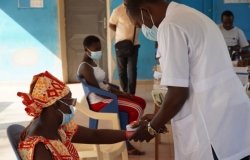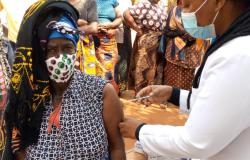Attitudes Towards Mask Wearing in MENA: The Impact of Gender and Education

Drazen Zigic / Shutterstock.com
“Real men don’t wear masks,” reported Independent Magazine in October 2020. Several news outlets documented that despite having higher death rates from contracting COVID-19, men were less likely to wear masks out of pride, confidence, prejudice, and their perceptions of their masculinity. We conducted an online survey to ascertain whether mask-wearing among Arabs varies by educational level, national origin, sex, marital status, or age.
We leveraged our personal and professional Facebook, Twitter, and LinkedIn profiles to launch an online questionnaire between February 3 and 19, 2021, garnering a response from 363 men and 357 women. Most respondents live in the Middle East and North Africa (MENA) region, while 11 percent reside in the US, Canada, or Europe.
The largest pool of respondents was from Tunisia (20 percent), followed by Jordan (18 percent), and Morocco (10 percent). About 11 percent originate from Palestine, and nine percent report living in Palestine. Although we did not design the survey to be representative of the MENA region’s opinion as a whole, it’s worth noting the data collected is skewed heavily towards college-educated people and those pursuing professional careers. Among our sample, 50 percent of respondents have bachelor’s degrees and 44 percent have at least a master’s degree. This skew, however, likely creates a conservative bias in our findings as mask adoption and other preventative behavior is consistently found to increase with higher education levels.
We surveyed respondents’ opinions on their risk of contracting the virus, preparedness for preventing its spread, and level of responsibility to protect themselves and others by asking to what extant respondents agree with the following statements:
- Wearing a mask is not always needed in public
- Wearing a mask is a sign of weakness
- Pressure to wear a mask is exaggerated
- Wearing a mask is embarrassing sometimes
Our findings suggest that within their education, age, and marital status groups, women more frequently report mask-wearing and taking actions to prevent the spread of the virus.
Our findings suggest that within their education, age, and marital status groups, women more frequently report mask-wearing and taking actions to prevent the spread of the virus. We also find married individuals tend to report these behaviors at higher rates than singles. Individuals over 40 are similarly more cautious than other age groups, and those with a graduate degree are significantly more informed on how to prevent the spread COVID than individuals with less educational attainment. Overall, women, and individuals with advanced degrees do not lose confidence when wearing mask, and have the great sense of control in preventing the spread of COVID-19.
Breaking down the results
Just as countries in the region did not have equal resources in mitigating the spread of the virus, individuals’ sense of control in combating COVID-19 also varied. Assessing whether the mask affected individual confidence, we found that most people do not feel embarrassed by wearing a mask nor view it as a sign of weakness, especially in Lebanon and the Gulf. However, Libyans and Yemenis did feel embarrassed by the mask. Viewing the mask as a sign of respect for others varied across countries, with Lebanese showing the most respect and people in the Gulf, Algeria and Yemen showing the least respect. People in the Gulf felt that wearing a mask gave them a sense of control to stop the spread of the virus whereas less than half of Syrians and Yemenis felt the same. Generally, at least three-quarter of people across the region expressed confidence regarding knowledge about the virus and how to combat it, especially in Lebanon and the Gulf.
Wearing Mask Reduces the Spread of Covid-19
Generally, all groups understand the benefits of wearing a mask. 94 percent of women and 95 percent of high school graduates believe that wearing a mask reduces the spread of the virus, whereas men and singles (especially between the age of 25 and 39) are less likely to believe that wearing a mask will curb the pandemic (87 and 78 percent respectively). Geographically, Libyans are the least likely to believe the benefits of mask-wearing (79 percent) while people in Iraq and Egypt (96 and 95 percent respectively) were most likely to believe that wearing a mask reduces the spread of COVID-19.
Risk Assessment
Roughly 70 percent of respondents believe their risk of contracting the virus is low. We have not determined whether this positive outlook is due to the relatively slow spread of the virus in the region. However, according to the Arab Barometer, concern about the spread of COVID-19 is still high among citizens in MENA, though this concern has decreased in several countries.
Men and women did not differ in their concerns of contracting the virus (70 and 72 percent respectively). Singles have a slightly higher risk assessment than married individuals. Interestingly, individuals under the age of 25 and those over 40 feel they are at a low risk of catching COVID-19, while respondents between the age of 25 and 39 believe they are at a greater risk. Education matters slightly: individuals with a graduate degree are 5 percent more confident that they are at a low risk compared to the other groups. Only 51 percent of Syrians assess their risk of contracting the virus to be low, while Yemenis and Libyans are most confident in being at low risk (83 percent).
Self-Assessing Knowledge on How to Prevent Spread of COVID-19
Two-thirds of the respondents feel informed enough to prevent the spread of COVID-19. Men and women did not differ in their self-assessment (69 and 68 percent respectively). Marital status and age are the greatest determinants of preparedness; three-fourths of married people believe they know how to prevent the spread of the virus, compared to only half of the singles surveyed. Likewise, three-fourths of individuals over the age of 40 self-assessed favorably, compared to half of individuals under 25 and two-thirds of individuals between 25 and 39 years.
Respondents with a graduate degree are 3 percent more confident in their ability to prevent the spread of COVID-19 than those with only a bachelor’s degree or less. Geographically, Lebanese are most confident in their knowledge of how to prevent the spread (92 percent), while only around half of Tunisians and Moroccans believed they know how to prevent the spreading of the virus (59 and 58 percent respectively).
Attitudes Toward the Spread of COVID-19
A quarter of women and one-third of men believe everyone is likely to contract the virus. Married individuals are more likely to agree than singles, and strikingly one-third of respondents between 25 and 39 said ‘yes’ compared to only one-quarter of the other age groups. Respondents with a graduate degree were the least likely to agree with this assumption (8 percent), while one-third of individuals with a bachelor’s degree believe that the spread of COVID-19 is imminent.
Half of the respondents from Syria and Yemen feel a sense of helplessness when it comes to curbing the spread of the virus. Less than one-third of Libyans and only 18 percent of Egyptians share this sentiment.
Pressure to Wear a Mask Might Be Exaggerated and Unnecessary
One-third of men believe the pressure to wear a mask in public is exaggerated, compared to only 13 percent of women. On average, one in five respondents feel the pressure is unnecessary and exaggerated regardless of their age, marital status, or educational attainment. Responses varied by country as follows:
Impact of Mask Wearing on Self-Confidence
Overall, responses to question whether wearing a mask is a sign of weakness were in the single digits, with the exception of Libyans and Yemenis (11 and 12 percent respectively). The same is true when it comes to feeling embarrassed during mask-wearing. Responses to this question were in the single digits, except for men (12 percent), Libyans (29 percent), and Yemenis (32 percent). Only 4 percent of women expressed feeling embarrassed by wearing the mask.
Conclusion and Policy Recommendations
Akin to other surveys conducted in the United States and elsewhere, our data reveals that women are significantly less likely than men to express an anti-mask attitude.
While constrained by several limitations, this survey uncovered important beliefs related to COVID-19 in the MENA region. Akin to other surveys conducted in the United States and elsewhere, our data reveals that women are significantly less likely than men to express an anti-mask attitude.
The paucity of research on the links between health behaviors during the COVID-19 pandemic, gender, and education in the MENA region is a key driver behind this essay and the online survey. The findings allow us to prescribe a few policy recommendations for various entities in the region to consider, especially as COVID-19 rates continue to rise, albeit in varying degrees, across the MENA region.
First, in recording COVID-19 infection rates, fatality rates, and response to treatment, it is important to ensure all data is disaggregated by sex and educational attainment, and to make this data public and accessible to researchers. Availability of such data will help governments and health officials design more informed health policies and regulations. This data is also instrumental in tailoring health messages to local populations.
As strict lockdowns are imposed in some countries and non-compliance fines are proving harmful to women yet insufficient to control the spread of the virus, a gendered approach to policy might be worth considering.
Secondly, when applicable, public messaging should be gender sensitive. While this may appear farfetched in the absence of sex disaggregated data, gendered messaging serves to shed light on an often ignored yet simple approach. As strict lockdowns are imposed in some countries and non-compliance fines are proving harmful to women yet insufficient to control the spread of the virus, a gendered approach to policy might be worth considering.
Finally, in addition to gender-sensitive policymaking, it’s important to better understand how gender impacts health behaviors in MENA. Studies comparing men and women’s general health behaviors in the region are unfortunately scarce. Such information is critical to better address illness and disease in a region that suffers from inadequate public health services. Investing in scientific studies that look at differences, if any, of men’s and women’s health behaviors is crucial for governments, the private health sector, or international health-focused organizations to undertake in the Middle East and North Africa.
The views expressed in this article are personal to the author and do not represent those of the Wilson Center, which does not take positions on policy issues.
Rita Stephan’s views do not represent those of the U.S. government.
About the Authors

Middle East Program
The Wilson Center’s Middle East Program serves as a crucial resource for the policymaking community and beyond, providing analyses and research that helps inform US foreign policymaking, stimulates public debate, and expands knowledge about issues in the wider Middle East and North Africa (MENA) region. Read more















